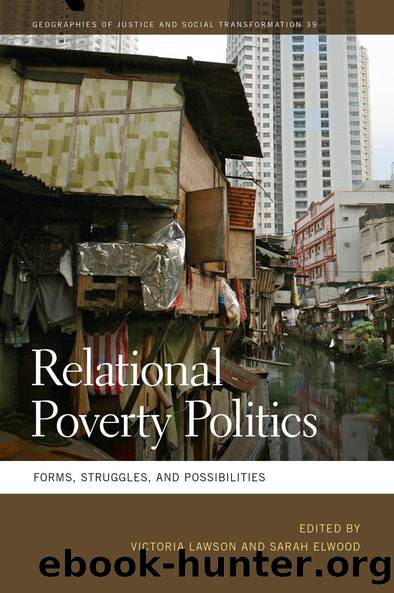Relational Poverty Politics by unknow

Author:unknow
Language: eng
Format: epub
Tags: Fiction & Literature, Literary Theory & Criticism, American, Nonfiction, Social & Cultural Studies, Social Science, Anthropology
ISBN: 9781496824349
Publisher: University Press of Mississippi
Published: 2019-08-23T04:00:00+00:00
Late Liberalism and Liberal Embodiments
No market is âfree.â The liberal economies that discard such surpluses are deeply embedded in a spectrum of polities and political institutions. Indeedâfree-market dogma notwithstandingâall economies are socially produced through everyday practices, institutions, and cultural values. The value of things reflects the values ascribed to life and, more to the point, the differing values of different lives. Feminist scholars and theorists of racial formation, for example, have long argued that the construction and exploitation of gendered and racial differences are fundamental to capitalist accumulation (e.g., Gibson-Graham 1996; Lipsitz 2006). In other words (and at the risk of stating the obvious), liberal capitalism is always political, and always embodied.
Here I flesh out (take or leave the pun) some of the ways in which this is so in the political present. Iâll connect certain ontological dots between three scales of analysis: on-the-ground forms of habitus and hexis; collective formations of identity and enfleshment; and the broad biopolitical structures of âlate liberalism.â In naming the multiscalar assemblages so constituted, I suggest a tentative theoretical apparatus to trace the distribution of late liberal discipline across a spectrum of differences that crisscross the fleshy palimpsests that are our bodies, impoverishing or privileging them in different ways, but always already incorporating them into the biopolitical regimes of market and state. These assemblages are what I call liberal embodiments.
Povinelli (2011) uses the term âlate liberalismâ to describe a broad configuration of cultural, economic, and state power distinctive to recent decades. Late liberalism weaves together many threadsâfrom the direct administration of racialized state violence to the selective deployment of compassion in the public sphere and the normative discursive power by which differences are disciplined and logics of economic calculation privileged. She situates this confluence within a long genealogy of liberal states and capitalism. Her framework captures congruencies between a range of contemporary liberal iterations, from the postcolonial condition of indigenous peoples to the heteronormative discipline of reproduction and caring labor.
For Povinelli, late liberalism is overdetermined by two definitive features: neoliberalismâa form of governmentality that measures the value of all social life according to the criteria of the marketâand the paradoxical imperative to mark and manage the participation of a spectrum of social differences in a realm defined by the abstract individuation of its participantsâthe project of recognition described at the outset. Late liberalism is therefore that set of technologies and discourses by which difference is incorporated into the social contracts of market and state. It responds equally to challenges both from within and without, recuperating resistance from indigenous movements, postcolonial studies, poor people, people of color, feminists, and myriad Others. The doctrine of multiculturalism, in which difference and culture are celebrated, and made economically productive at the same time as they are politically annulled, is a classic project of late liberalism. Marriage equality is another.
Indeed, as I described earlier, even more radical, critical voices are partly absorbed within late liberal vernacularsâconsider FNBâs invocation of natural rights, or the conception of cultural property that underwrites
Download
This site does not store any files on its server. We only index and link to content provided by other sites. Please contact the content providers to delete copyright contents if any and email us, we'll remove relevant links or contents immediately.
Cecilia; Or, Memoirs of an Heiress — Volume 1 by Fanny Burney(32533)
Cecilia; Or, Memoirs of an Heiress — Volume 2 by Fanny Burney(31931)
Cecilia; Or, Memoirs of an Heiress — Volume 3 by Fanny Burney(31923)
The Great Music City by Andrea Baker(31907)
We're Going to Need More Wine by Gabrielle Union(19028)
All the Missing Girls by Megan Miranda(15912)
Pimp by Iceberg Slim(14473)
Bombshells: Glamour Girls of a Lifetime by Sullivan Steve(14043)
For the Love of Europe by Rick Steves(13840)
Talking to Strangers by Malcolm Gladwell(13338)
Norse Mythology by Gaiman Neil(13327)
Fifty Shades Freed by E L James(13224)
Mindhunter: Inside the FBI's Elite Serial Crime Unit by John E. Douglas & Mark Olshaker(9307)
Crazy Rich Asians by Kevin Kwan(9268)
The Lost Art of Listening by Michael P. Nichols(7485)
Enlightenment Now: The Case for Reason, Science, Humanism, and Progress by Steven Pinker(7302)
The Four Agreements by Don Miguel Ruiz(6735)
Bad Blood by John Carreyrou(6606)
Weapons of Math Destruction by Cathy O'Neil(6253)
